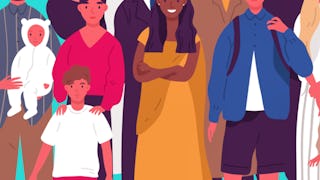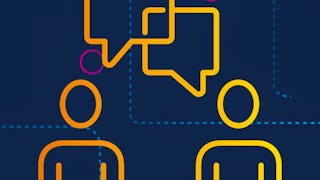In bringing about behavior change in public health, we often focus on the individual mother, student, or farmer. We should not forget the community structure and norms constrain for encouraging individual health behaviors. This course examines the community context of the changes needed to promote the public’s health. We begin by examining the various definitions of ‘community’ and the processes by which we ‘diagnose’ or seek to understand the structure and characteristics of different types of communities.



Community Change in Public Health
This course is part of Foundations of Global Health Specialization

Instructor: William Brieger, DrPH
13,636 already enrolled
Included with 
(170 reviews)
Skills you'll gain
Details to know

Add to your LinkedIn profile
4 assignments
See how employees at top companies are mastering in-demand skills

Build your subject-matter expertise
- Learn new concepts from industry experts
- Gain a foundational understanding of a subject or tool
- Develop job-relevant skills with hands-on projects
- Earn a shareable career certificate


Earn a career certificate
Add this credential to your LinkedIn profile, resume, or CV
Share it on social media and in your performance review

There are 5 modules in this course
This week, we'll get oriented to the course, learn about the ecological model, and learn how to classify communities on the basis of identity, linkages, group orientation, and integration.
What's included
3 videos6 readings1 assignment1 discussion prompt
Welcome to Week 2 of Community Change in Public Health. This week's lectures will focus on Community Efficacy and Community Change Models. Learning these concepts will help you gain a deeper understanding of the forces at work within communities and how they can be harnessed to affect positive change.
What's included
4 videos1 assignment1 discussion prompt
Welcome to Module 3. This week, we'll take a look at the political economy framework as well as the concepts of community participation and involvement levels. You'll also complete your first peer review assignment this week by reading a case study and using what you've learned to describe community change.
What's included
3 videos1 assignment1 peer review
This week, we'll look at community coalitions, contrasting community-based and community-directed programs, and the results of enhancing community-directed treatment.
What's included
3 videos1 assignment
In this final week, we'll learn about the Community-Directed Intervention (CDI) process, an expansion beyond the Community-Directed Treatment process used with Ivermectin. Finally, you will complete your second peer-review assignment in which you'll describe a community from a case study and also describe two possible interventions to sustain the change that is already underway.
What's included
1 video1 reading1 peer review
Instructor

Offered by
Why people choose Coursera for their career




Learner reviews
170 reviews
- 5 stars
74.70%
- 4 stars
20%
- 3 stars
2.94%
- 2 stars
1.17%
- 1 star
1.17%
Showing 3 of 170
Reviewed on Feb 20, 2017
It was a very insightful course as it showed us how community change is effected in developing countries. The case studies were practical and showed the change that occurs in reality, not just theory
Reviewed on Mar 20, 2017
It is a very useful insight into community change in public health and a must for every one who want to ensure sustainability is integrated into his intervention
Reviewed on Jun 29, 2019
Good course, but apparently not enough students to complete the peer review in a timely manner.

Get access to all these courses and more with a subscription


University of Michigan


University of Rochester


Imperial College London


Imperial College London
Career resources

Unlock access to 10,000+ courses with a subscription
Explore roles and skills, learn more effectively with Coursera Coach, and earn recognized credentials
Advance your career with an online degree
Earn a degree from world-class universities - 100% online
Join over 3,400 global companies that choose Coursera for Business
Upskill your employees to excel in the digital economy
Frequently asked questions
Access to lectures and assignments depends on your type of enrollment. If you take a course in audit mode, you will be able to see most course materials for free. To access graded assignments and to earn a Certificate, you will need to purchase the Certificate experience, during or after your audit. If you don't see the audit option:
The course may not offer an audit option. You can try a Free Trial instead, or apply for Financial Aid.
The course may offer 'Full Course, No Certificate' instead. This option lets you see all course materials, submit required assessments, and get a final grade. This also means that you will not be able to purchase a Certificate experience.
When you enroll in the course, you get access to all of the courses in the Specialization, and you earn a certificate when you complete the work. Your electronic Certificate will be added to your Accomplishments page - from there, you can print your Certificate or add it to your LinkedIn profile. If you only want to read and view the course content, you can audit the course for free.
If you subscribed, you get a 7-day free trial during which you can cancel at no penalty. After that, we don’t give refunds, but you can cancel your subscription at any time. See our full refund policy.
More questions
Financial aid available,

